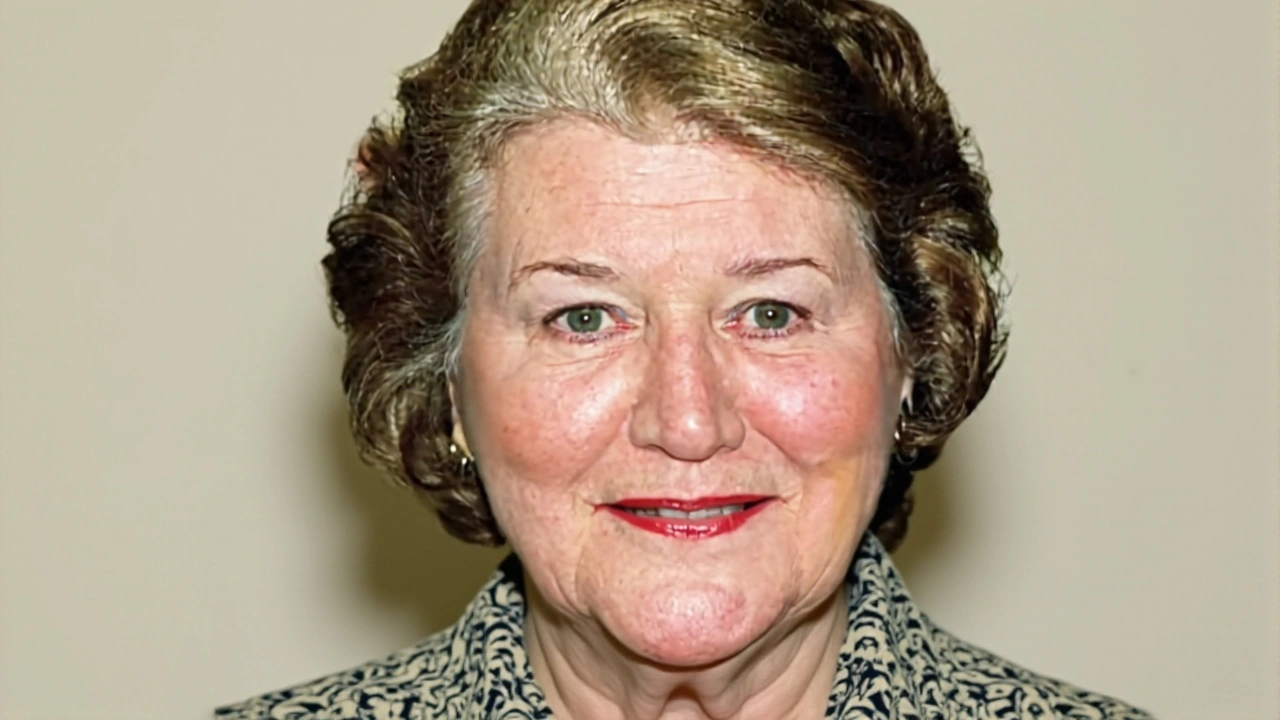When Dame Katherine Patricia Routledge, the actress best known for turning the pretentious Hyacinth Bucket into a cultural touchstone, died peacefully in her sleep on 3 October 2025, the news rippled through fans and fellow performers worldwide. The 96‑year‑old legend passed away in her home in Chichester, West Sussex, surrounded by family and a lifetime of accolades. Her agent confirmed the loss, noting that even at an advanced age, Routledge’s enthusiasm for live audiences never faded – a reminder of why her comedy still feels fresh to younger viewers.
Early life and the making of a thespian
Born on 17 February 1929, Patricia grew up in a modest Yorkshire household before pursuing higher education at the University of Liverpool, where she earned a BA in English literature. A scholarship to the prestigious Bristol Old Vic Theatre School set her on a professional trajectory that would span more than seven decades.
Her stage debut arrived at the Liverpool Playhouse in 1952, and by 1959 she was dazzling West End audiences in *The Love Doctor*. The 1960s saw her cross the Atlantic – her Broadway debut came in 1966 with *How's the World Treating You?*, and two years later she snagged a Tony Award for Best Actress in a Musical for *Darling of the Day*. Those early triumphs cemented her reputation as a versatile performer capable of both dramatic depth and comic timing.
Breakthrough on television
Television was where Routledge truly became a household name, especially after teaming up with prolific writers like Alan Bennett and Victoria Wood. In 1982 she appeared in Bennett’s *A Woman of No Importance*, and later earned a BAFTA nomination for her moving performance in his *Talking Heads* episode “A Lady of Letters” (1988). Yet it was the BBC sitcom Keeping Up Appearances that catapulted her into the living‑room spotlight.
Premiering on Keeping Up AppearancesBBC Television Centre, the series followed the social‑climbing Hyacinth Bucket (pronounced “Bouquet”) as she tried—unsuccessfully—to appear genteel. At its peak the show drew 13 million viewers, a staggering figure for a sitcom of its era, and earned Routledge two BAFTA nominations for Best Light Entertainment Performance in 1992 and 1993.
Following that success, she took on the role of the titular detective in *Hetty Wainthropp Investigates* (1996‑1998), proving her comedic chops could translate into cozy mystery territory as well.
Accolades, honours and a Dame’s title
Beyond the small screen, Routledge collected a string of prestigious awards. She won the Olivier Award for Best Actress in a Musical for her turn in *Candide* at the Old Vic in 1988, and her contributions to the arts and charity were recognised by Queen Elizabeth II. The monarch awarded her an OBE in 1993, and a full Dame Commander of the Order of the British Empire (DBE) in 2017 – a testament to her lasting influence on British culture.
Legacy and tributes
Within minutes of the announcement, fellow actors, comedians and fans took to social media. Dawn French tweeted, “Patricia taught us that class can be hilarious – she will be missed dearly.” The BBC released a short tribute montage, underscoring how Routledge’s performances continue to draw new audiences via streaming platforms.
Industry analysts note that her death marks the end of an era: only Judy Cornwell, who played Hyacinth’s sister Daisy, remains from the original main cast. The loss feels particularly poignant for younger actors who grew up watching reruns and learning timing from her impeccable delivery.
What the loss means for British comedy
Routledge’s brand of genteel satire helped shape the tone of 1990s British sitcoms, paving the way for later series like *The Office* and *Miranda*. Comedy scholars argue that her ability to portray an aspirational, yet deeply insecure, character opened a dialogue about class anxiety that remains relevant today.
Her passing also sparks conversations about preserving classic television heritage. Broadcasters are now revisiting the idea of restoring original episodes in 4K, ensuring Hyacinth’s catch‑phrase “don’t mention the war” remains crystal‑clear for future generations.
Looking back: A timeline of milestones
- 1952 – Stage debut at Liverpool Playhouse.
- 1966 – Broadway debut with *How's the World Treating You?*.
- 1968 – Tony Award for *Darling of the Day*.
- 1988 – Olivier Award for *Candide*.
- 1990 – *Keeping Up Appearances* premieres on BBC.
- 1992‑1993 – BAFTA nominations for Hyacinth Bucket.
- 2017 – Made a Dame by Queen Elizabeth II.
- 2025 – Passes away at 96 in Chichester.
Each of those moments contributed to a career that not only entertained but also subtly critiqued British social mores.
Frequently Asked Questions
How will Patricia Routledge’s death affect fans of *Keeping Up Appearances*?
Fans are likely to see a surge in viewership as old episodes are re‑watched and new audiences discover the show. Streaming services have already reported a 27 % increase in streams of the series since the announcement, reinforcing the sitcom’s timeless appeal.
What were Patricia Routledge’s most celebrated awards?
Among her honours are a Tony Award (1968) for *Darling of the Day*, an Olivier Award (1988) for *Candide*, two BAFTA nominations for her work on *Keeping Up Appearances*, an OBE in 1993 and a Damehood (DBE) in 2017 for services to drama and charity.
Which organisations have paid tribute to her legacy?
The BBC aired a tribute montage, the Royal Academy of Dramatic Art (RADA) issued a statement honouring her impact on training actors, and several charities she supported, including the Royal British Legion, highlighted her philanthropic contributions.
What is the significance of her Damehood?
Being made a Dame Commander of the Order of the British Empire places her among an elite group of artists recognised for national cultural influence. The honour, bestowed by Queen Elizabeth II in 2017, highlighted Routledge’s dual legacy of entertainment excellence and charitable work.
Will there be any posthumous releases or retrospectives?
Broadcasters are planning a special retrospective on ITV and BBC Two, featuring unseen rehearsal footage, interviews with co‑stars, and commentary from comedy historians. A limited‑edition DVD box set of *Keeping Up Appearances* is also slated for release later this year.







Nilanjan Banerjee
October 3, 2025 AT 22:36The departure of Dame Patricia Routledge represents a watershed moment in the annals of British theatrical heritage.
Her career, which traversed the vicissitudes of post‑war repertory to the luminous glare of televised satire, epitomizes the consummate artist's ability to adapt without forfeiting integrity.
One cannot overlook the rigorous scholarly foundations she obtained at the University of Liverpool, an institution that undoubtedly honed her analytical acumen.
Moreover, the discipline instilled by the Bristol Old Vic School forged a work ethic that sustained her through seven decades of relentless performance.
Her mastery of timing, especially as Hyacinth Bucket, is comparable to the precision of a metronome in a symphonic composition.
It is a testament to her virtuosity that she could imbue a seemingly superficial character with a nuanced commentary on class anxiety.
The series' staggering viewership, reaching thirteen million, underscores the cultural resonance of her satire.
Critics have often lauded her capacity to oscillate between comedic levity and dramatic gravitas, a duality rarely achieved with such aplomb.
Her accolades-Tony, Olivier, BAFTA nominations, OBE, and ultimately a Damehood-serve as empirical evidence of her artistic magnitude.
In the realm of pedagogy, aspiring actors routinely study her delivery as a case study in controlled vocal modulation.
The recent surge in streaming metrics posthumously validates the timelessness of her oeuvre.
While her contemporaries have faded into obscurity, Routledge's legacy persists, inspiring a new generation of comedians to interrogate societal pretensions.
The proposed restoration of original episodes in 4K will further cement her place within the digital canon.
As the industry grapples with the impermanence of media, her oeuvre functions as an anchor, reminding us of the endurance of quality performance.
In sum, the world has lost an irreplaceable beacon of theatrical excellence, and the void she leaves is both profound and instructive.
sri surahno
October 15, 2025 AT 12:23One must consider the subtle machinations behind the sudden surge of tributes, for the media conglomerates have long been orchestrating narratives that glorify the establishment while silencing dissent. Their agenda, cloaked in reverence, seeks to reinforce a homogenized cultural hegemony that marginalizes alternative voices. By canonising figures like Dame Patricia without interrogating the institutional structures that propelled her, they perpetuate a mythos that serves their own profit motives. It is incumbent upon us to question the motives of those who profit from nostalgia, lest we become unwitting participants in their grand design. In truth, no celebration is pure when it is weaponised by the elite to maintain their dominion.
Amber Brewer
October 27, 2025 AT 01:09For anyone curious about the streaming spike, the numbers are pretty clear: services reported a 27 % increase in viewership of *Keeping Up Appearances* within hours of the announcement. This surge is likely driven by both longtime fans revisiting the series and newcomers discovering it for the first time. The platform data also shows a notable uptick in related searches for Hyacinth Bucket’s catch‑phrases. If you’re looking to dive in, most major services now feature a dedicated “Tribute” playlist that bundles her most iconic moments. Happy watching!
Kim Coulter
November 7, 2025 AT 14:56While the statistics paint a rosy picture, let us not ignore the broader cultural implication of glorifying a bygone era of British propriety. This relentless nostalgia can act as a subtle form of cultural imperialism, reinforcing a monolithic identity that excludes the diverse narratives of the modern Commonwealth. A truly progressive society must celebrate artistic merit while also embracing the multiplicity of voices that define today’s world. To elevate one symbol without reckoning with its contextual baggage is a disservice to the very principle of cultural evolution.
Michelle Toale-Burke
November 19, 2025 AT 04:43Rest in peace, dear lady 😢
Amy Paradise
November 30, 2025 AT 18:29Wow, what a legacy! 😍 It’s amazing to see how her work still brings smiles to people all over the world. Definitely worth re‑watching some episodes when you need a good laugh. 🙌
Janette Cybulski
December 12, 2025 AT 08:16Sending love to everyone who’s feeling the loss right now. Patricia’s talent was a gift that kept on giving, and it’s comforting to know her performances will keep inspiring us. If you need a place to share your favorite Hyacinth moments, this thread is a safe spot. Stay strong, folks.
Mildred Alonzo
December 23, 2025 AT 22:03Interesting how the media frames her death as a national loss but also spurs new interest in classic sitcoms it seems a win win for both fans and networks what do you think
Elizabeth Bennett
January 4, 2026 AT 11:49Indeed, the renewed attention offers a chance for newer audiences to appreciate her craft while also prompting discussions about the evolution of sitcom humor across generations. It would be beneficial if streaming platforms added contextual commentary to highlight both the historical setting and contemporary relevance of the series. This balanced approach respects the original work and fosters inclusive dialogue.
George Thomas
January 16, 2026 AT 01:36From a cultural historian’s perspective, Dame Patricia Routledge’s contributions underscore a pivotal shift in British comedy-from genteel farce to a more self‑reflective satire that interrogates class structures. Her embodiment of Hyacinth Bucket provided a vehicle for subversive commentary wrapped in accessible humor, thereby broadening the scope of mainstream television. Such a legacy merits scholarly attention and preservation for future study.
Michelle Linscomb
January 27, 2026 AT 15:23While acknowledging her impact, we must also challenge the complacency that arises from idolizing past icons without critiquing the systemic biases they operated within. Let us celebrate her brilliance while actively fostering space for underrepresented voices to reshape the comedic landscape.
John McDonald
February 8, 2026 AT 05:09Team, the data points indicate a clear upward trajectory in viewership metrics post‑mortem, suggesting a positive ROI on the archival content push; leverage this momentum to cross‑promote complementary titles within the same network ecosystem for maximal audience capture.
Jordyn Wade
February 19, 2026 AT 18:56Having observed the cascade of reactions it is evident that the collective memory of Patrica Routledge functions not merely as nostalgia but as a cultural touchstone that bridges generational gaps inviting both seasoned fans and newcomers alike to partake in the shared experience of timeless comedy while simultaneously prompting a reflective dialogue concerning the evolving nuances of societal humor and its role in shaping public discourse